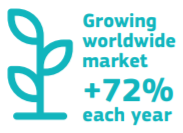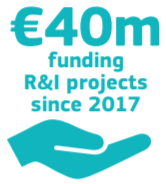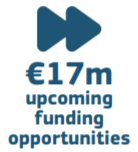You can also download the brochure as a PDF
The Internet today
The Internet is the engine of digitisation of our society and our economy. As connectivity increases, the boundaries between the real and the digital world are blurring. With the explosion of the Internet of Things (IoT), multimedia content and social media, the Internet offers an unprecedented access to data and online services. Artificial intelligence helps to extract meaning from this data and to embed autonomy and intelligence into networks, connected objects and services.
However, there has been an erosion of trust in the Internet following revelations about the exploitation of personal data, large-scale cybersecurity and data breaches, and growing awareness of online disinformation.
Tomorrow’s Internet
The Next Generation internet (NGI) initiative aims to build the key technology blocks of a human-centric Internet, which gives end-users full control of their personal data. Through advanced technologies, new decentralised business and social models will ensure secure and trustworthy access for all.
The mission of NGI is to re-imagine and re-engineer the Internet. The information age should enable human potential, mobility and creativity in an inclusive way – while dealing responsibly with our natural resources.
The NGI at a glance
The NGI comprises an ambitious research and innovation programme with an EC investment of more than €250m between 2018 and 2020. Focus is on advanced technology including privacy and trust, search and discovery, decentralised architectures, blockchain, IoT, social media, interactive technologies, as well as technologies supporting multilingualism and accessibility.
Challenges
- Protect personal data
- Ensure privacy and security
- Combat disinformation online
- Guarantee access and freedom of choice
- Respect fundamental rights
- Enforce ethics and sustainability by design
An ambitious plan to support innovation
To attract top talents, €75m of grants are directly supporting innovators from individual researchers, to developers, to start-ups and social innovators.
- 80% of applicants are new to Horizon 2020
- 120 projects running
- 750 applicants in the first six months
Next Generation Internet supporting Internet innovators
The NGI initiative funds European innovative research projects that make it possible to imagine and develop a new Internet that is safer, more open, more respectful of people and more useful to all citizens.
Research and Innovation actions
Grants are cascading: 20% to select, monitor, mentor, train and build the community; 80% to fund individual projects from researchers, developers, hi-tech start-ups or businesses.
- Ledger: the project enables data as a common good. Selected innovators empower people to solve problems using decentralised technologies such as blockchain or peer to peer.
- NGIO PET: this project enables data as a common good. Selected innovators empower people to solve problems using decentralised technologies such as blockchain or peer to peer.
Funding concrete projects
- CryptPad: an open source, private-by-design online collaboration tool with built-in data encryption
- Searx: an open, do-not-track search tool that unifies private and personal data search
- Consento: a decentralised digital vault for businesses to manage confidential data, using peer-to-peer encrypted storage
- WorldBrain.io: a browser extension that tackles misinformation and social polarisation with collective web intelligence
NGI Coordination
The NGI builds on coordination and support actions to ensure synergies across all parts of the programme, with a focus on:
- Outreach & community building
- Policy & strategic programming
- EU-US collaboration
Language equality and web accessibility in the digital age
NGI upholds and integrates fundamental EU values - such as linguistic diversity and accessibility for persons with disabilities to allow everyone to take part in the digital economy and society.
At work on several fronts
- Foster competitiveness and language diversity
- Increase web accessibility through personalised assistive technology
- Improve human-machine interaction, increase productivity and inclusion
Featured highlights
- Multilingual Europe Technology Alliance counts more than 800 members in more than 50 countries
- The European Language Grid with 20 pilot projects in 32 National Competence Centres
- Easy Reading, personalised features for people with cognitive disabilities to use online content
- WAI-Tools, boosts automation of accessibility, evaluation and remediation
Research areas
Natural Language Processing and Understanding; Machine Translation; Automatic Speech Recognition; Multilingual Information Retrieval; Sign Languages; Assistive Technologies and Accessibility solutions addressing diverse types of disability
Interactive Technologies and Immersive Environments

Future Interactive Technologies will allow users to access, process and deliver information more efficiently and less intrusively. There is high potential to transform sectors including education, healthcare, culture, manufacturing, engineering, live events, retail, construction, entertainment and media.
Future interactions - focus areas

- Multi-user interaction systems for professional and private life applications
- Future interactive systems - knowledge, algorithms and tools
Ongoing work - examples

- XR4ALL: Strengthen the European Cross Reality/immersive technology industry
- iMARE CULTURE: Advanced Virtual Reality, iMmersive serious games and Augmented REality for European underwater CULTURal heritagE
- WhoLoDance: Whole-Body Interaction Learning for Dance Education
Highly multi-disciplinary field

- Artistic skills
- Virtual Reality / Augmented Reality
- 3D technologies / computer vision
- Wearables, haptics, speech recognition
- Powerful narrative and educational instruments
Digital Innovation and Blockchain
Blockchain and Distributed Ledger Technologies can help reduce costs while increasing trust, traceability and security. They have huge potential for making social and economic online transactions more secure by guarding against an attack and removing the need for any middleman.
Accelerating blockchain development and uptake
Placing Europe as the global leader in the development and use of blockchain and distributed ledger technologies across our economy and public services.
- The blockchain derived business value will grow to $3 trillion by 2030
- The EU Blockchain Partnership gathers 30 European countries
- €100 million in equity investments through the European Investment Fund are planned
- The International Association of Trusted Blockchain Applications gathers 150 more than members
- €5m Blockchain for social good prize
- Blockchain Observatory & Forum has mapped 700+projects in Europe and is maintaining a EU Blockchain online community of 2000+contributors
At Work on Several Fronts
- Bringing together experts through the EU Blockchain Observatory and Forum
- Aligning governments and EU policy through the European Blockchain Partnership and the European Blockchain Services Infrastructure
- Mobilising industry players through the International Association of Trusted Blockchain Applications
Upcoming funding opportunities
- Blockchain for NGI: support human centricity, openness, decentralisation, inclusiveness and privacy: €20m
- Pre-Commercial Procurement for the development and testing of a novel, use-cases based, distributed ledger or blockchain solution which builds on the EU legal framework: the General Data Protection Regulation (GDPR), Electronic Identification and Trust Services (eIDAS) Regulation, and the Network and Information Systems (NIS) Directive: €7m
- Next Generation Internet of Things: Interoperability for data sharing, protection of privacy, data monetisation and contractual arrangements: €5-8m
Blockchain and distributed ledger technologies allow access to data in a secure, transparent, verifiable and disintermediated way
- By the Financial Sector for payment solutions, securities and insurance products.
- By the Transport Sector for connecting mobility services and autonomous vehicles.
- By the Energy Sector to integrate renewable electricity generation in Europe’s grids.
- By the Health & Pharma Sectors to trace the origins of goods in a reliable manner.
- By the Public Sector to protect democracy, improve e-voting and use of e-identities.
Sectors currently using blockchain in Europe
- 19% Government Services
- 25.76% Tech, IT, Telecommunications
- 14.90% FInancial Services, FinTech, KYC, AML
- 8.83% Education
- 6.07% Media, Entertainment, Publishing
- 7.58% Supply Chain, Transportation, Industrial Manufactoring
- 4.30% Energy, Environment, Utilities
- 5.56% Non-Profit or Social Impact
- 2.53% Healthcare
- 5.30% Other
Media Convergence and Social Media
Next generation social networks, media and platforms will define the way we communicate, exchange, do business, create, learn and share knowledge. The challenge is to accompany a positive evolution of Social Media, overcoming issues such as trust, civic engagement, governance and economic sustainability.
Future Hyper-Connected Sociality - focus areas
- Social Media Innovation
- Fight against disinformation online
- Collective and Connected Intelligence (including AI)
- Media convergence
- Immersive technologies
- New contents distribution
- STARTS – Science, Technology, Arts initiative
Future Social Media and Collective Intelligence will be the cornerstone of a human-centric NGI
Achievements
Initiatives for changes in the media value chain; pilot cases for new media distribution and immersive technologies; social media pilots; a platform for fact-checkers and a code of conduct for tackling disinformation online; technology artist residencies and industrial pilot projects for artists.
NGI is here to stay!
NGI will drive the evolution of the Internet in line with EU norms and values. It will be an essential driver for the long-term competitiveness of the European economy. NGI aims to unite a vibrant community of Internet innovators and stakeholders around a common goal: building an Internet of humans.
Next step focus areas
- Electronic identities
- Service and data portability
- Internet architecture renovation
- Personalised and inclusive learning
Upcoming opportunities
- Blockchain and Distributed Ledger Technologies
- Trust in Internet information exchange and content with blockchain
- Emergence of collective intelligence on the Internet
NGI- a 10-year investment plan
- Continued improvements to the EU regulatory framework and a 10-year investment plan in key Internet technologies under NGI will shape the development of an Internet that is trustworthy, open, and that contributes to a more sustainable and inclusive society
- NGIhas been proposed as an intervention area in Horizon Europe (2021-2027) to support in an integrated way the evolution of Internet technologies, infrastructures and applications
